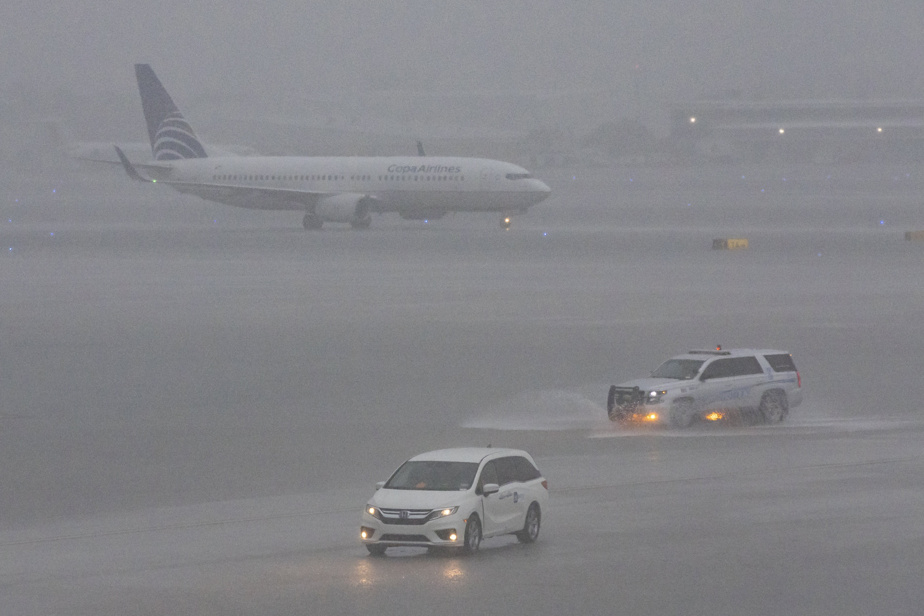(Fort Lauderdale) A tropical disturbance has brought a rare flash flood emergency to much of South Florida, as residents prepare to deal with more heavy rain Thursday and Friday.
Wednesday’s heavy rains and subsequent flooding blocked roads, washed away vehicles and delayed the Florida Panthers on their way to their Stanley Cup game in Canada against the Edmonton Oilers.
The disorganized storm system was moving across Florida from the Gulf of Mexico around the same time as the start of the hurricane season, which this year is expected to be one of the most active in recent memory amid fears that climate change increases the intensity of storms.
According to the National Hurricane Center, the disturbance has not reached cyclone status and has only a small chance of transforming into a tropical system when it emerges into the Atlantic Ocean after crossing Florida.
The National Weather Service in Miami said in a message posted on the social network X early Thursday that a band of heavy precipitation was expected over the region for the third day in a row.
“Even a short duration of heavy rain could lead to additional flash flooding,” the message warns.
Many roads remain flooded and impassable to vehicles. On the main thoroughfare, Interstate 95 in Broward County, southbound traffic was being detoured around a flooded section and contractors were on their way to clear the drainage system, the Florida Highway Patrol said in an email. The highway will not reopen until the water is cleared, the agency said.
The Miami Weather Service has issued increasingly alarmist warnings.
“Life-threatening flooding is occurring,” the service said on social platform X. “Please stay off roads and move to higher ground. »
The mayors of Fort Lauderdale and Hollywood declared a state of emergency for their cities Wednesday afternoon. Later in the day, Florida Governor Ron DeSantis also declared a state of emergency for five counties: Broward and Miami-Dade, on Florida’s Atlantic coast, and Collier, Lee and Sarasota counties , on the west coast of the state.
Miami-Dade County Mayor Daniella Levine Cava also declared a local state of emergency.
Dozens of flights were delayed or canceled at Fort Lauderdale-Hollywood International Airport. The NHL’s Florida Panthers were delayed more than three hours departing Fort Lauderdale for their nearly six-hour flight to Edmonton for Games 3 and 4 of the Stanley Cup Final.
Further north, the National Weather Service in Melbourne confirmed that an EF-1 tornado struck Hobe Sound on Florida’s Atlantic coast, north of West Palm Beach, on Wednesday morning.
The winds toppled several trees and damaged a store, Martin County firefighters said. No injuries were reported, but access to the wealthy island of Jupiter was cut off by debris on the road.
Florida has already had a wet and turbulent week. In Miami, about 15 centimeters of rain fell Tuesday and 17 centimeters in Miami Beach, according to the National Weather Service. Hollywood received about 12 centimeters of water.
Bryan McNoldy, a senior research associate at the University of Miami’s Rosenstiel School, noted on X that about 9 inches (23 centimeters) fell in parts of South Florida between 7 a.m. and 6 p.m. Wednesday, in addition to the rain that fell Tuesday.
“We’re in trouble,” Mr. McNoldy warned.
More precipitation is forecast for the rest of the week, leading the Miami Weather Service office to extend a flash flood watch through Thursday. Some locations could receive an additional 15 centimeters of rain.
The west of the state, much of which has experienced prolonged drought, also received significant rainfall. Nearly 6.5 inches of rain fell Tuesday at Sarasota Bradenton International Airport, according to the weather service, and flash flood warnings were also in effect in those areas.
Forecasts are calling for an exceptionally busy hurricane season.
The National Oceanic and Atmospheric Administration, a US federal agency, estimates that there is an 85% chance that the Atlantic hurricane season will be above average, predicting between 17 and 25 named storms in the coming months, including up to 13 hurricanes and four major hurricanes. An average season has 14 named storms.




